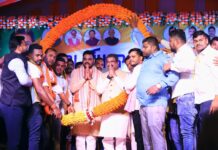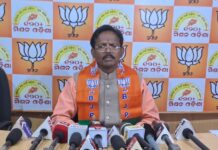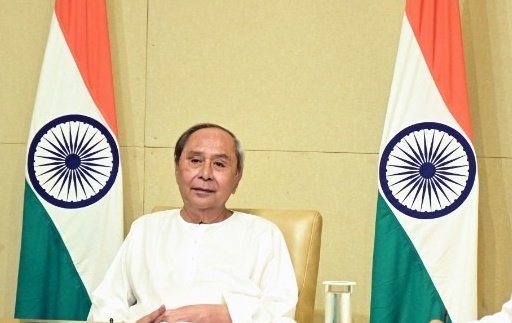By Dr Bhabani Shankar Nayak
LONDON: Democratic identity encompasses more than just political processes and governance structures; it is about the empowerment and development of citizens. At its core, democratic identity reflects the intricate interplay between the state, government, political parties, and citizens, influenced by diverse ideologies aimed at fostering democratic progress and ensuring the well-being of the populace.
This postcolonial state-government-citizenship identity is not merely a static construct but a dynamic relationship that evolves through the active participation of citizens in shaping their societies. It thrives on the principles of inclusivity, accountability, and respect for human rights, fostering an environment where all voices are heard, and all individuals are afforded equal opportunities for political engagement and socio-economic advancement.
The democratic identity also entails beyond the boundaries of formal institutions; it permeates the social fabric, cultural norms, and collective consciousness of a society. It encompasses a shared commitment to the values of freedom, justice, and equality, serving as a unifying force that transcends individual differences and fosters a sense of common purpose and belonging.
In essence, democratic identity is not just a matter of political allegiance or legal frameworks; it’s a reflection of the collective aspirations and aspirations of a people united in their pursuit of a more just, equitable, and prosperous society based on science and secularism. It is through nurturing and upholding this identity that nations can truly realise the promise of democracy and fulfil the aspirations of their citizens.
In such context, the prospect of an alliance between the ruling BJD and the opposition BJP in the upcoming state and general elections raises significant concerns for democracy in the state. Such a collaboration, while potentially advantageous for the parties involved in terms of electoral gains, threatens to undermine the very foundation of democratic principles and processes. At the heart of democracy lies the concept of political pluralism, where diverse voices and viewpoints are encouraged to compete openly and fairly within a framework of rules and institutions within constitutional framework.
The formation of an alliance between the ruling BJD and opposition party BJP risks eroding this essential aspect of democracy by limiting political competition and diminishing the accountability of those in power. Such an alliance could further consolidate political power in the hands of a few, potentially leading to a monopolisation of governance and a weakening of checks and balances. This concentration of power not only undermines the principle of separation of powers but also deprives citizens of meaningful alternatives and avenues for dissent and opposition.
The alliance between the ruling BJD and opposition party BJP raises questions about the integrity of the political process and erode public trust in the democratic system. It creates perceptions of backroom deals and compromises that prioritise partisan interests over the welfare of the electorate, thereby delegitimising the electoral process and disenfranchising the populace. It is imperative for stakeholders in Odisha’s democracy to reaffirm their commitment to the principles of transparency, accountability, and political competition. Instead of resorting to alliances that may undermine these principles, political parties should focus on engaging with citizens, addressing their concerns, and offering viable solutions to the challenges facing the state.
Ultimately, the strength and vibrancy of Odisha’s democracy will depend on the ability of its citizens and leaders to uphold the core values of democratic governance and resist efforts to subvert them for short-term political gain. Only by safeguarding the integrity of the democratic process can Odisha truly fulfil its potential as a beacon of democracy and progress.
The trend of political leaders in Odisha frequently switching parties reflects a concerning erosion of ideological integrity and a prioritization of electoral calculations over democratic principles. In this scenario, democracy appears to have devolved into an ideology-free zone, where the pursuit of power trumps the adherence to core values and beliefs. The cynical view of citizens as mere numbers in a vote box, rather than as active participants in the democratic process, is a troubling reflection of this trend.
When electoral victory becomes detached from principles and values, democracy itself is diminished, and the trust between citizens and political leaders is eroded. In a healthy democracy, citizens are empowered to make informed political decisions based on the principles and policies espoused by political parties. However, when leaders prioritise party politics over the interests of the electorate, they undermine the very foundation of democratic governance. The constant shifting of political allegiances not only breeds cynicism among voters but also weakens the accountability mechanisms that are essential for a functioning democracy.
Without a clear commitment to principles and values, political leaders may prioritize short-term gains over long-term development, leading to a cycle of instability and disillusionment among the populace. To address this challenge, there is a need for an alternative politics with renewed focus on restoring trust and accountability within Odisha’s political landscape. Political leaders must demonstrate a genuine commitment to democratic principles, transparency, and ethical conduct. Additionally, citizens must actively engage in holding their representatives accountable and demand integrity and consistency in political leadership. Ultimately, a robust democracy depends on the active participation and vigilance of its citizens, as well as the principled leadership of elected officials. By upholding democratic values and rejecting opportunistic politics, Odisha can reclaim its identity as a beacon of democratic governance and ensure that the voices of its citizens are heard and respected.
The trajectory of Odisha’s democracy reflects a dynamic interplay of historical legacies of feudalism, contemporary realities of market led society, and shifting power dynamics between higher caste and class leadership shaped by rising Hindutva politics. From the early years of statehood to the present day, political parties have played a crucial role in shaping governance and policy frameworks.
The dominance of regional parties like the Biju Janata Dal (BJD) has redefined the contours of Odisha’s political landscape, propagating the so-called indigenous leadership and grassroots empowerment. It is neither indigenous nor grassroot politics. It is purely feudal politics based on family legacies and opposition parties are no different from ruling parties.
Odisha’s democracy, in its search for identity, epitomises resilience, adaptability, and a commitment to inclusive development. As the state grapples with contemporary challenges and navigates the complexities of governance, it remains anchored in its rich cultural heritage and ethos of participatory democracy.
By embracing innovation, fostering social cohesion, and prioritising sustainable development, Odisha is poised to carve a distinct identity within Indian democracy, embodying the spirit of resilience and evolution. However, the time is crucial if democracy in the state wishes to survive and remain vibrant.When will the people of Odisha rise and reclaim their democracy from the few?
(The writer Dr Bhabani Shankar Nayak, hails from Eastern Indian State of Odisha, Presently Teaches at University of Glasgow, London, UK and has 2 Decades of Teaching Experience in British Universities. Views Expressed are Personal).



























